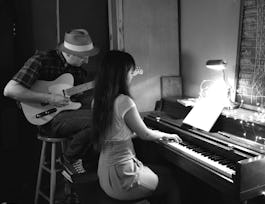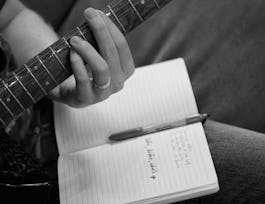Why just write poems when you can write better ones? This course is built on the notion that the most exciting writing begins after the first draft. It is specifically for folks who believe that writing poems just to express oneself is like using the Internet just for email. After all, poetry can change the way you and your readers think of the world and its inhabitants; it can break new ground for language; turn a blank sheet of paper into a teeming concert of voices and music.

Give your career the gift of Coursera Plus with $160 off, billed annually. Save today.


Sharpened Visions: A Poetry Workshop

Instructor: Douglas Kearney
140,661 already enrolled
Included with 
(1,779 reviews)
Skills you'll gain
Details to know

Add to your LinkedIn profile
5 assignments
See how employees at top companies are mastering in-demand skills


Earn a career certificate
Add this credential to your LinkedIn profile, resume, or CV
Share it on social media and in your performance review

There are 6 modules in this course
Poetry orchestrates its music, arguments, tensions, and environment via arrangements of language into lines and stanzas. This week we’ll address the importance of the line break, perhaps the most conspicuous, signature tool in the poet’s toolkit. Do you break more for sound, for sense, visual effect, shape, a mix of several? We’ll participate in several line break exercises and remix found poems. Also: prepare for your first quiz and a fun first writing prompt.
What's included
8 videos6 readings1 assignment
Abstraction doesn’t mean “deep,” and image doesn’t mean “picture.” Images are typically understood as anything you can literally touch/taste/see/hear/smell, and abstractions are those things for which we have symbols (a clock for “time,” a heart for “love”) but no image. Abstractions and images may fill our poems, but how can you tell what’s what, and how can you leverage them to compelling ends? This week we’ll work at finding new symbols to replace clichéd ones for abstractions and we’ll work at crafting images that do more than add furniture to a poem, but create systems of relationships, moods, and even style.
What's included
5 videos1 reading1 assignment
Most of us think of simile and metaphor, personification and other similar figures of speech as being about similarities between objects, concepts, and entities. But the juice in these formulas comes from how different the two things being compared seem to be. This is why writing: “the shark moved like a fish” is, alone, a lot less interesting than saying “the shark moved like a squad car.” We’ll talk about how playing with difference via juxtaposition can create a range of poetic effects. Then you’ll write a poem built of one robustly developed or several contrasting juxtapositions. We'll end this module with yet another quiz, and our first poetry workshop -- facilitated through a peer assessed assignment.
What's included
5 videos1 reading1 assignment1 peer review
This week we’ll explore how rhyme leverages patterns of sameness and how we can estrange similarity for compelling poetic effects. We’ll check out examples of “rhyme”—sonic, visual, conceptual—from outside of poetry too.
What's included
5 videos1 reading1 assignment
All spoken language has rhythm, the trick is working the rhythm in such a way that drives your poem toward the effects you’re after. Maybe you want a fluid, seductive, propulsive rhythm. Perhaps something that halts or stutters. We’ll use traditional western concepts of meter as a means to open the door to this discussion, but we may leave them at the door upon entry.
What's included
6 videos1 reading1 assignment1 peer review
When you revise a poem, you are not trying to dull the emotional flash of your first draft. You must, instead, intensify it. In this, our final week, we’ll discuss the difference between revision and editing, the art of reading your own work critically, and the beauty of drafts. For your final peer review, you’ll turn in (and in turn, assess) a revision of one of the poems from the preceding 5 modules.
What's included
11 videos1 reading1 peer review
Instructor

Offered by
Recommended if you're interested in Music and Art

University of Illinois Urbana-Champaign

University of Pennsylvania
Why people choose Coursera for their career




Learner reviews
Showing 3 of 1779
1,779 reviews
- 5 stars
82.78%
- 4 stars
13.90%
- 3 stars
1.85%
- 2 stars
0.56%
- 1 star
0.89%

Open new doors with Coursera Plus
Unlimited access to 7,000+ world-class courses, hands-on projects, and job-ready certificate programs - all included in your subscription
Advance your career with an online degree
Earn a degree from world-class universities - 100% online
Join over 3,400 global companies that choose Coursera for Business
Upskill your employees to excel in the digital economy
Frequently asked questions
Access to lectures and assignments depends on your type of enrollment. If you take a course in audit mode, you will be able to see most course materials for free. To access graded assignments and to earn a Certificate, you will need to purchase the Certificate experience, during or after your audit. If you don't see the audit option:
The course may not offer an audit option. You can try a Free Trial instead, or apply for Financial Aid.
The course may offer 'Full Course, No Certificate' instead. This option lets you see all course materials, submit required assessments, and get a final grade. This also means that you will not be able to purchase a Certificate experience.
When you purchase a Certificate you get access to all course materials, including graded assignments. Upon completing the course, your electronic Certificate will be added to your Accomplishments page - from there, you can print your Certificate or add it to your LinkedIn profile. If you only want to read and view the course content, you can audit the course for free.
You will be eligible for a full refund until two weeks after your payment date, or (for courses that have just launched) until two weeks after the first session of the course begins, whichever is later. You cannot receive a refund once you’ve earned a Course Certificate, even if you complete the course within the two-week refund period. See our full refund policy.



